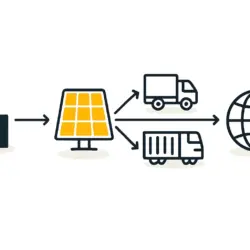Chad’s Push for Solar Energy in the Telecom Sector
Chad’s Minister of Communication and Digital Economy, Awatif El Djineïd, is urging telecom operators to power their facilities with solar energy. This initiative is part of a broader national strategy to reduce reliance on fossil fuels and promote renewable energy sources, with a key focus on the telecommunications sector. This development is significant for the latest Chad energy news.
Driving the Transition to Solar Power
Minister El Djineïd stressed the importance of shifting from traditional fossil fuels to renewables, highlighting solar as a key solution for powering telecom facilities. This transition is crucial for cutting greenhouse gas emissions and promoting environmental sustainability across the country.
The Chadian government is backing this effort with a renewable energy project already underway in collaboration with the World Bank. The project involves installing solar panels and batteries in strategic areas to ensure a steady electricity supply for the telecommunications industry.
“The government is committed to ensuring that the telecommunications sector contributes to the fight against climate change by opting for renewable energy sources,” stated El Djineïd.
Incentives for Telecom Operators
To encourage the shift to solar, the government is offering telecom operators several incentives, including tax breaks on solar equipment and financial aid. These measures are designed to make integrating renewable energy solutions as straightforward as possible for businesses.
Minister El Djineïd added that the government is prepared to offer further support for operators committed to solar energy, potentially through grants or other financial assistance to help offset the initial transition costs.
Benefits of Solar Energy for the Telecom Sector
Switching to solar energy offers the telecommunications sector several key advantages. For one, it provides a dependable and sustainable power source that is resilient to outages or grid fluctuations—a crucial benefit in a nation where Chad’s electricity production can be unreliable.
Solar energy is also a clean, renewable power source that reduces greenhouse gas emissions, helping combat climate change. By making the switch, telecom operators can substantially lower their carbon footprint and contribute to a healthier planet.
Furthermore, adopting solar energy can be the solution to rising operational costs. While the initial investment in equipment can be high, the long-term reduction in energy expenses promises to lower operating costs and boost profitability for telecom operators.
Government’s Broader Commitment to Renewable Energy
The Chadian government’s commitment to renewable energy extends across all sectors of the economy. The World Bank-supported project is just one example of its broader effort to build a cleaner, more sustainable energy system.
Beyond the telecommunications sector, the government is encouraging other industries to adopt renewable solutions as well. By providing incentives and support, it aims to make clean energy more accessible and affordable for businesses and individuals throughout the country.
The adoption of solar energy by Chad’s telecom operators marks a significant step toward a more sustainable and environmentally friendly energy system. With government support and incentives, these companies are well-positioned to transition to renewables and contribute to the fight against climate change.
For more insights on the challenges and advancements in renewable energy adoption, you can explore related topics at PVKnowhow.



